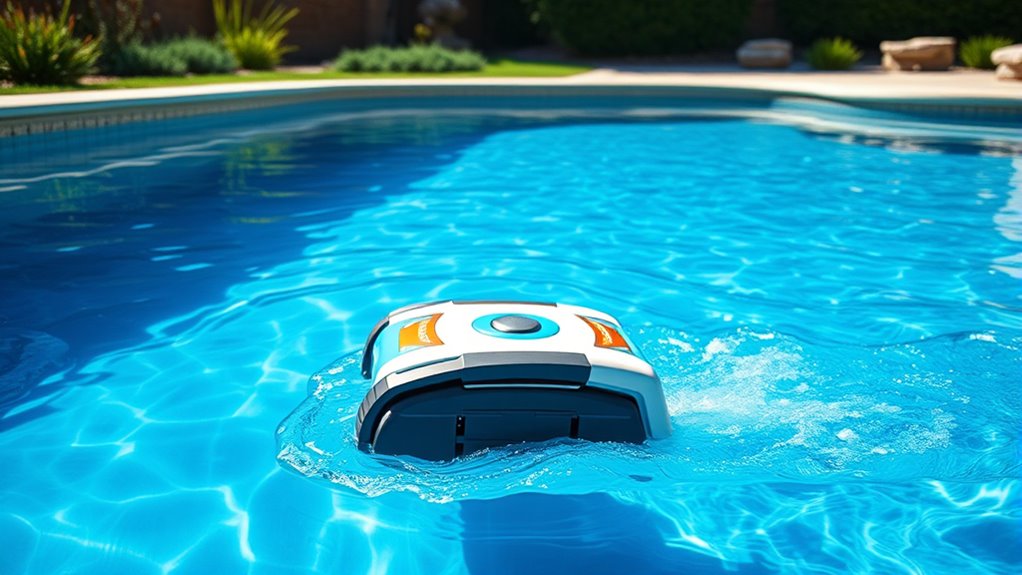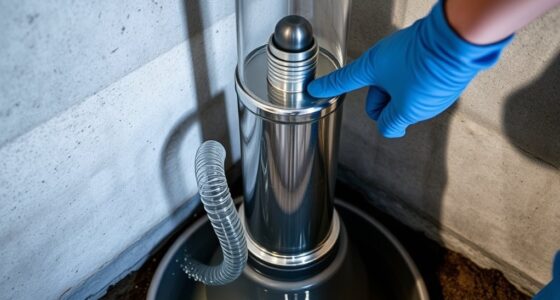Many people believe automatic pool cleaners can fully replace manual skimming, brushing, and regular maintenance, but that’s false. Not all cleaners are the same, and they can struggle with large or heavy debris or complex pool shapes. They don’t handle every surface perfectly, and ongoing upkeep is essential for peak performance. If you want to avoid common pitfalls and get the most from your cleaner, there’s more to learn below.
Key Takeaways
- Automatic cleaners do not replace skimming, brushing, and proper water circulation; manual maintenance is still essential for water quality.
- Not all cleaners are suitable for every pool size or shape; compatibility affects cleaning efficiency and coverage.
- Higher price does not always mean better performance; select models based on your pool’s specific needs and debris type.
- Automatic cleaners are effective for small debris but may struggle with large or heavy waste like sticks and rocks.
- Regular maintenance, including filter cleaning and hose inspection, is necessary to ensure optimal cleaner performance and longevity.
Automatic Pool Cleaners Can Replace Regular Skimming and Brushing
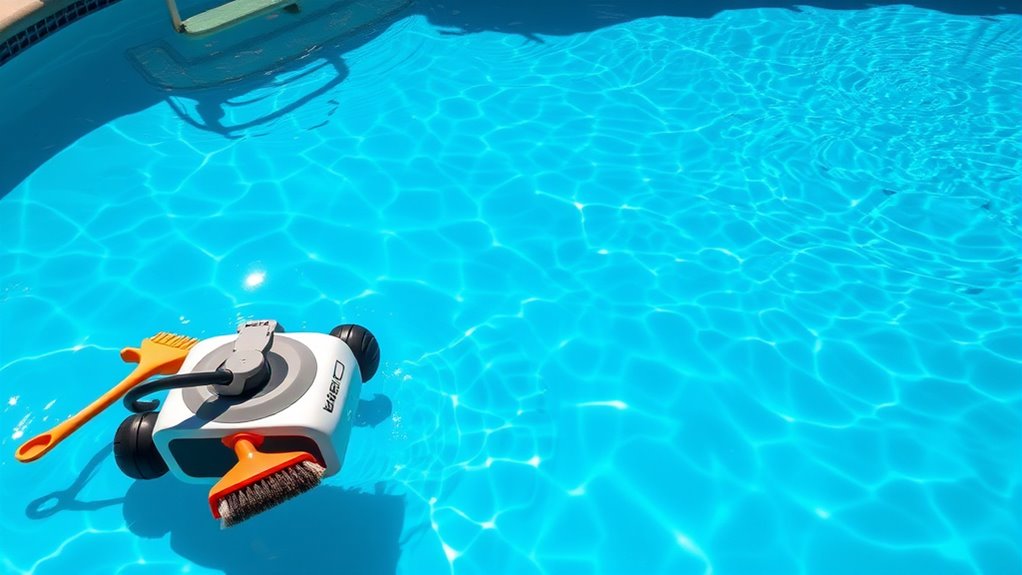
Many people believe that automatic pool cleaners can fully replace regular skimming and brushing, but this isn’t entirely true. While these devices efficiently remove debris, they don’t address all aspects of pool maintenance. Proper water circulation is essential for keeping your pool clean and balanced. Automatic cleaners help by moving debris towards the skimmer, but they can’t evenly distribute pool chemicals or break down algae on their own. Skimming and brushing manually ensure that water chemistry stays balanced, preventing algae growth and maintaining water clarity. Relying solely on an automatic cleaner might leave some areas neglected, affecting water quality. To keep your pool safe and inviting, combine automatic cleaning with regular skimming, brushing, and monitoring of pool chemical levels. Additionally, dog names inspiration can be a fun way to personalize your pool area with themed decor or accessories. Maintaining proper water chemistry is critical for preventing algae and bacteria buildup, which automatic cleaners alone cannot manage effectively, emphasizing the importance of manual maintenance for comprehensive pool care. Furthermore, understanding how automatic pool cleaner technology works can help you maximize its efficiency and complement manual cleaning routines.
All Automatic Pool Cleaners Are Created Equal
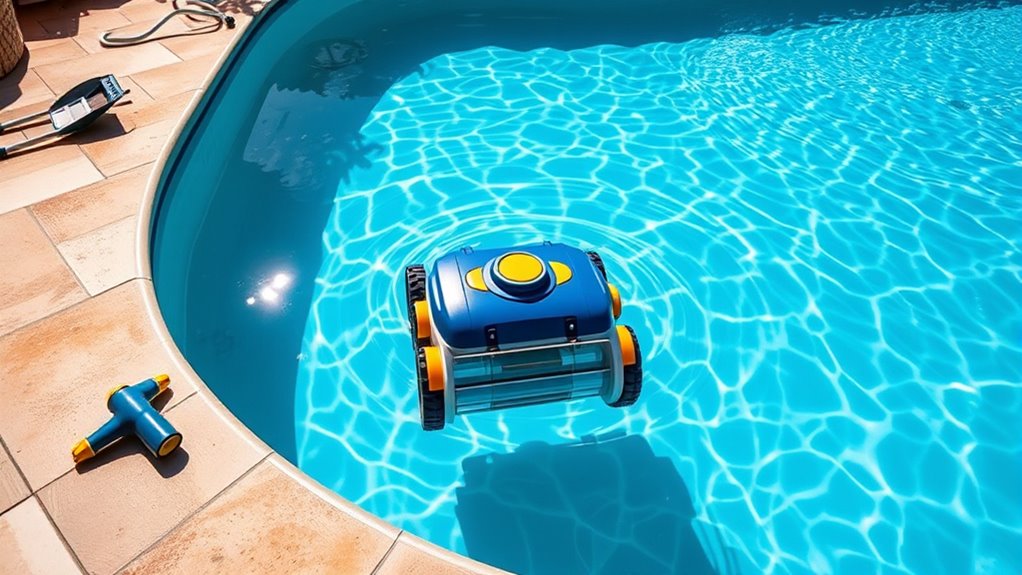
Not all automatic pool cleaners are the same; they vary widely in design, features, and performance. Your pool size plays a big role in choosing the right cleaner, as some models are better suited for small pools, while others handle larger areas with ease. Battery life also varies considerably; some cleaners run for just 45 minutes, while others last over two hours. If you have a large pool, a model with longer battery life can save you time and effort, reducing the need for frequent recharging. Cheaper options might not cover your entire pool efficiently or have the power needed for thorough cleaning. Investing in a model tailored to your pool size and with sufficient battery life ensures better performance and a cleaner pool. Additionally, considering high contrast ratios can enhance the visibility of detailed debris during cleaning, leading to more effective pool maintenance. Understanding automatic pool cleaner types can help you select the most suitable model for your specific needs. Furthermore, selecting a cleaner with advanced navigation features can improve coverage and reduce missed spots. Being aware of performance differences among models can help ensure you choose a reliable and efficient cleaner for your pool. Recognizing the importance of long-term maintenance can also extend the lifespan and efficiency of your cleaner.
They Can Clean Every Type of Debris Effectively
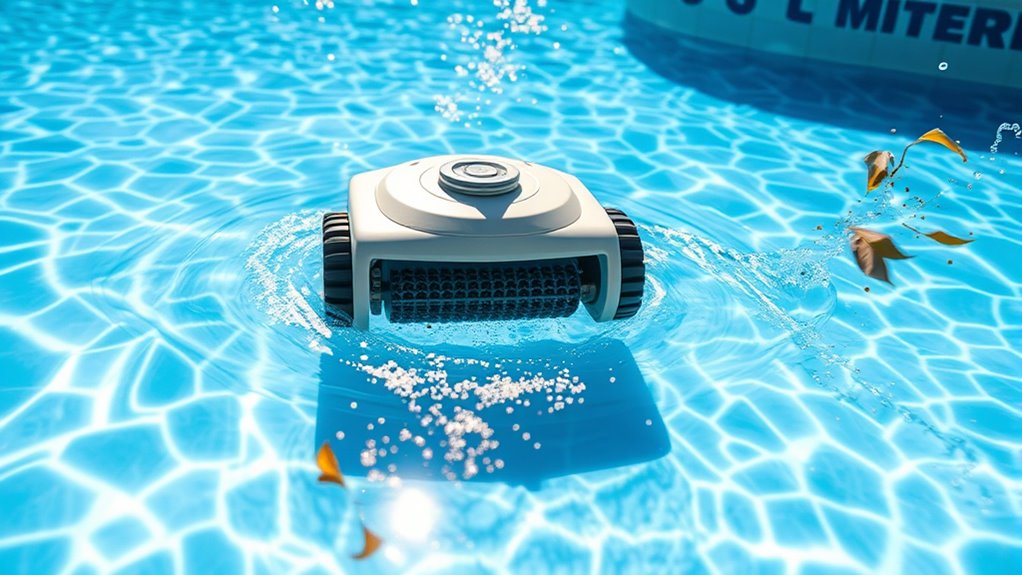
Automatic pool cleaners are great at picking up small debris like leaves and dirt, but they struggle with heavy waste such as large sticks or rocks. They also work well on organic materials like algae, though some models may leave behind stubborn spots. Understanding these limitations helps you choose the right cleaner for your pool’s specific needs.
Effectiveness on Small Debris
Automatic pool cleaners are often praised for their ability to handle small debris effectively, making maintenance easier. Their design allows them to pick up leaves, dirt, pollen, and algae particles efficiently. You’ll notice that their effectiveness on small debris depends on the model and type, but generally, they excel in this area. To maximize their performance, look for models with fine filters or specialized brushes. Additionally, selecting appropriate filter systems can significantly enhance debris collection. Keep in mind:
- Fine mesh filters trap tiny particles better
- Properly sized debris bags prevent clogs
- Regular maintenance maintains effectiveness
- Some models have adjustable suction power
- Using aesthetic wall organization systems can help keep your pool area tidy and reduce debris buildup around the pool.
With the right cleaner, small debris doesn’t stand a chance, simplifying your pool upkeep and ensuring a cleaner swim every time.
Limitations With Heavy Waste
While automatic pool cleaners are designed to handle various types of debris, they often struggle when faced with heavy waste like large leaves, twigs, or algae buildup. Heavy waste can cause clogging challenges, reducing the cleaner’s efficiency and sometimes halting operation altogether. These devices may miss debris that’s too bulky or tangled in their brushes or filters, especially if they aren’t equipped with larger intake ports. Heavy waste can also clog hoses or filters, forcing you to stop and clear blockages frequently. As a result, your cleaner won’t be able to maintain a consistently clean pool. It’s important to understand that automatic pool cleaners aren’t a catch-all solution for every type of debris, especially when heavy waste is involved. Additionally, understanding the bedroom design principles can help you optimize your pool area for relaxation and aesthetic appeal.
Performance on Organic Material
Heavy waste can hinder a pool cleaner’s performance, but when it comes to organic material like dirt, algae, and small plant matter, these devices are highly effective. They excel at removing organic debris from the pool floor and surfaces, often surpassing manual cleaning. However, performance issues can arise if the cleaner isn’t properly maintained or if filters are clogged. To guarantee ideal cleaning:
- Check and clean filters regularly to prevent clogging
- Ensure brushes and suction ports are free of obstructions
- Use the correct cleaner type for your pool surface
- Program the cleaner to cover the entire area thoroughly
- Incorporate essential oils such as eucalyptus or tea tree oil into your pool maintenance routine to help prevent microbial growth and keep the water healthier.
- Understanding the impact of automation in pool cleaning can help optimize device performance and reduce manual effort.
- Selecting the appropriate automatic pool cleaner based on debris type and pool size can further improve cleaning efficiency.
- Regular maintenance, including inspecting hoses and connections, can also improve overall cleaning performance.
- Additionally, choosing a suitable cleaning schedule ensures consistent debris removal and maintains water clarity.
While organic debris isn’t usually a problem, neglecting maintenance can reduce efficiency. Overall, automatic pool cleaners are designed to handle organic material effectively, making your pool cleaner and healthier.
They Require Minimal Maintenance
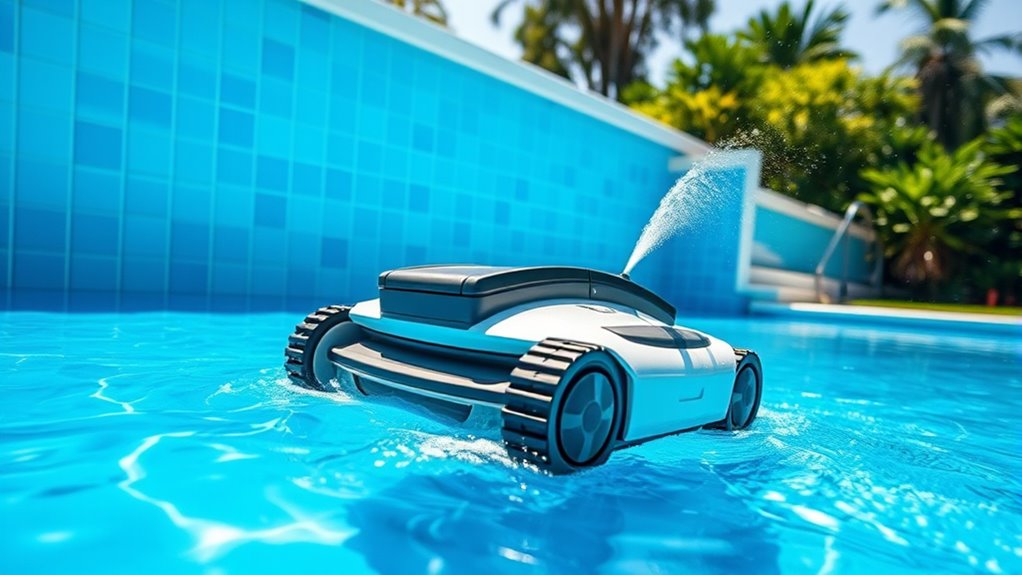
Believing that automatic pool cleaners require little to no maintenance can lead to surprises. While they’re designed to be convenient, you still need to care for them regularly. One key aspect is understanding different filter types; some filters need frequent cleaning to prevent clogs, while others last longer before needing a rinse. Additionally, battery life varies depending on usage and model, and it’s essential to recharge or replace batteries as needed. Neglecting these maintenance tasks can reduce your cleaner’s efficiency and lifespan. Regularly checking and cleaning filters, ensuring batteries are charged, and following manufacturer recommendations keep your cleaner running smoothly. Furthermore, being aware of filter maintenance, which includes inspecting and replacing filters when necessary, can significantly impact your device’s performance and longevity. Proper maintenance helps prevent issues such as clogged filters and ensures optimal operation. In addition, understanding how battery care influences overall device performance can extend the lifespan of your cleaner. Don’t assume minimal upkeep means zero effort—you’ll get better results and longer-lasting performance with consistent care.
They Are Always Fully Autonomous and Trouble-Free
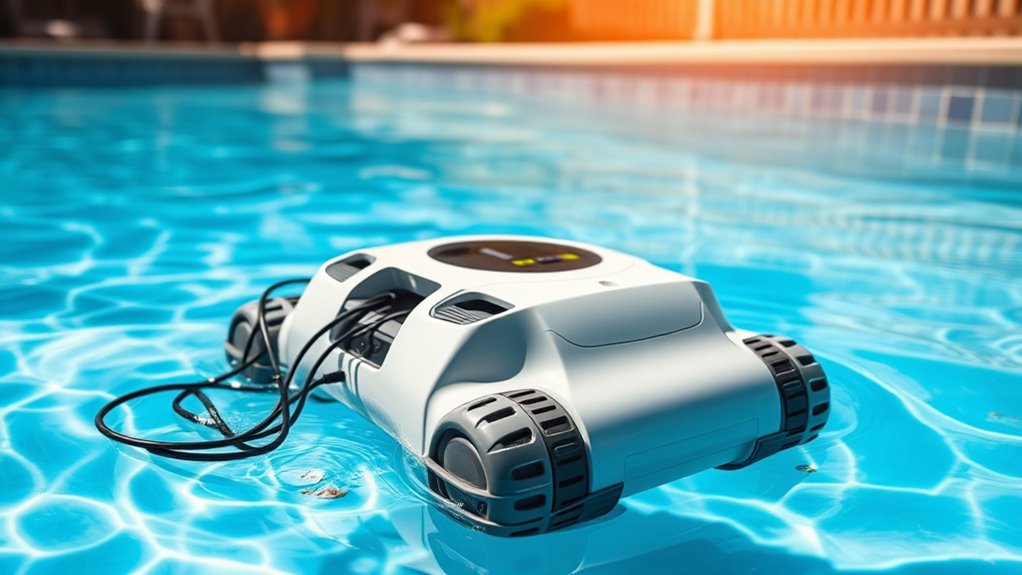
Many automatic pool cleaners give the impression that they are completely autonomous and trouble-free, but that’s not entirely accurate. While they handle cleaning tasks efficiently, you still need to monitor their performance. For example, battery lifespan may decline over time, reducing runtime and cleaning effectiveness. Noise levels can also vary, sometimes becoming disruptive during operation. Additionally, occasional issues like tangled cords or clogged filters require your attention. Regular maintenance is essential to keep them running smoothly and prevent unexpected breakdowns. Even the most advanced models aren’t immune to occasional glitches or battery issues, so expecting total independence is a misconception. Being proactive helps ensure your cleaner remains reliable and effective, rather than a source of frustration. Proper maintenance is key to extending the lifespan and maintaining optimal performance of your automatic pool cleaner. Recognizing performance decline early can help address issues before they become major problems. Moreover, understanding AI advancements can aid in selecting models with better self-diagnostic capabilities. Staying informed about technological updates can also help you optimize your cleaner’s functionality and troubleshoot common problems more effectively. Additionally, understanding system limitations can help manage expectations and improve overall satisfaction with your pool cleaning system.
Costlier Models Are Always Better
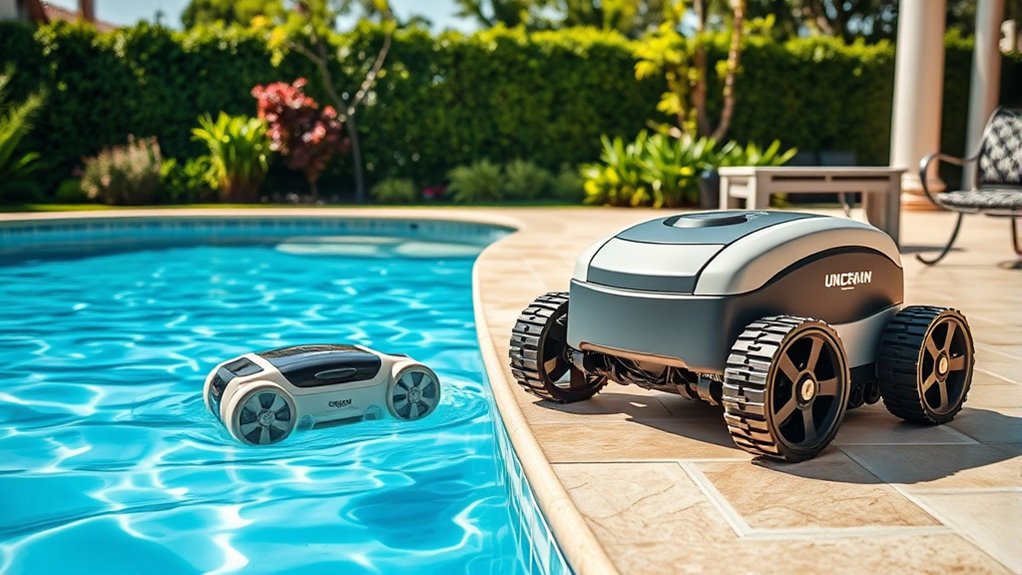
Just because a pool cleaner costs more doesn’t mean it’s automatically better. Prices vary widely, and higher cost doesn’t guarantee better features or durability. Sometimes, budget-friendly models can do the job just as well for a fraction of the price.
Price Doesn’t Guarantee Quality
While a higher price often suggests better features or durability, it doesn’t always mean that a more expensive automatic pool cleaner will perform better for your needs. Price misconceptions can lead you to assume that costly models are automatically top-quality, but that’s not always true. To avoid this, focus on your specific requirements rather than price alone. Keep in mind:
- Lower-priced cleaners may still effectively handle your pool’s size and debris.
- Premium models might include unnecessary features for your situation.
- Compatibility and ease of use often matter more than price.
- Brand reputation doesn’t guarantee superior performance for your circumstances.
Features Vary Widely
It’s a common misconception that costlier automatic pool cleaners always come with better features. In reality, pool cleaner types vary widely, and higher price doesn’t guarantee superior performance. Some models focus on powerful scrubbing, while others prioritize energy efficiency or ease of use. Features like programmable schedules, remote control, or advanced navigation differ across price ranges, but they’re not always necessary for your needs. Additionally, maintenance requirements can vary; more complex cleaners might need more frequent upkeep, increasing long-term costs. Cheaper models may be simpler but still effective for basic cleaning tasks. Remember, selecting a pool cleaner should be based on your pool size, type, and cleaning needs, not just the price tag. A higher cost doesn’t automatically mean it’s the best choice for you.
Budget Options Available
Many assume that the more expensive automatic pool cleaners are always the better choice, but that’s not necessarily true. There are plenty of cost-effective options that deliver reliable cleaning without breaking the bank. Budget-friendly choices often have essential features that suit smaller pools or light debris. You can find models that are easy to operate and maintain, offering good value for your money.
Consider these budget options:
- Basic robotic cleaners with effective suction
- Corded models with simple navigation
- Mid-range cleaners with programmable settings
- Lightweight models ideal for quick cleanups
They Can Handle Large or Complex Pool Shapes Without Issues
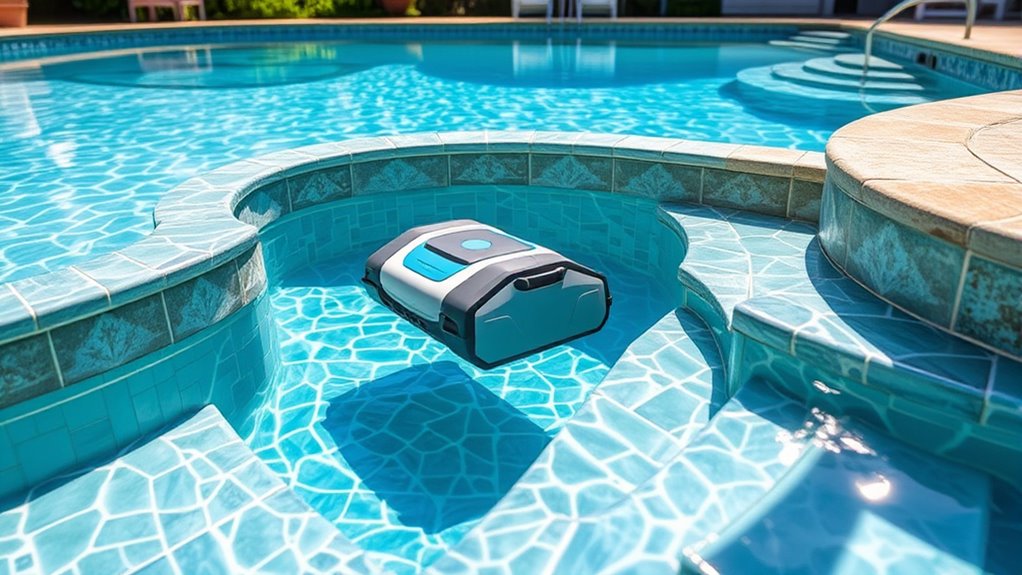
Automatic pool cleaners are often praised for their efficiency, but assuming they can easily handle large or complex pool shapes is a misconception. Many believe these cleaners can navigate any pool shape effortlessly, but pool shape limitations can hinder performance. Curved, multi-level, or irregular designs may confuse the cleaner’s navigation, leaving some areas untouched. Additionally, debris complexity plays a role—large leaves or tangled debris can clog filters or slow movement. While these cleaners excel at standard shapes, their ability to clean thoroughly in more intricate pools isn’t guaranteed. You might find that certain areas remain uncleaned or require manual intervention. To ensure complete coverage, consider the pool’s shape and debris types before choosing an automatic cleaner.
Automatic Cleaners Save You Money on Pool Maintenance
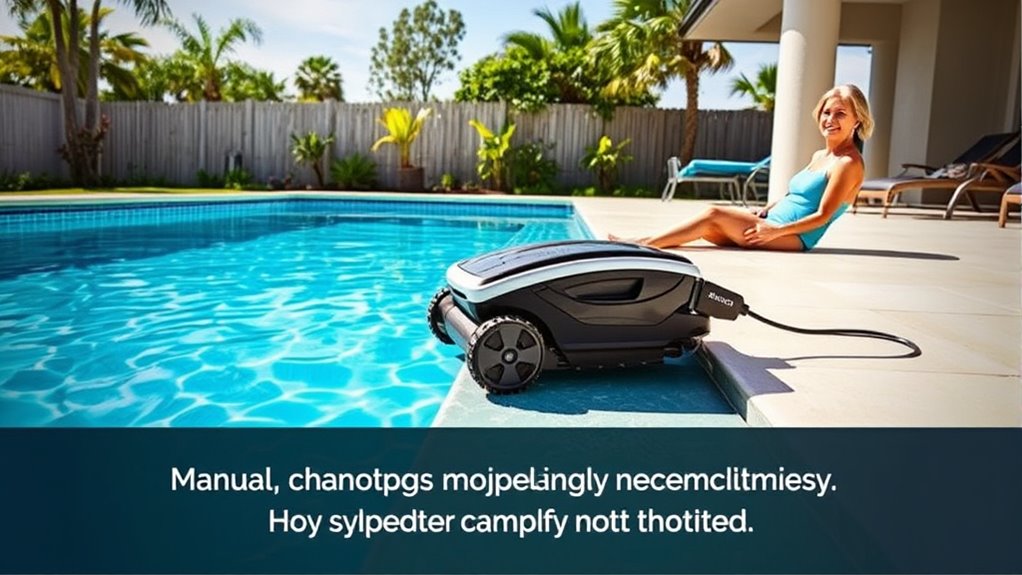
While automatic pool cleaners may struggle with large or complex pool shapes, they still offer significant savings on maintenance costs. They help reduce the need for professional cleaning and minimize chemical imbalance caused by debris buildup. A thorough cost analysis shows that investing in a cleaner pays off over time through lower maintenance bills. Plus, modern models are designed for energy efficiency, consuming less power than traditional skimming methods.
Consider these benefits:
- Reduced labor and professional service expenses
- Less chemical use due to cleaner water
- Lower energy bills thanks to efficient operation
- Extended pool equipment lifespan
They Work Just as Well on All Pool Surfaces
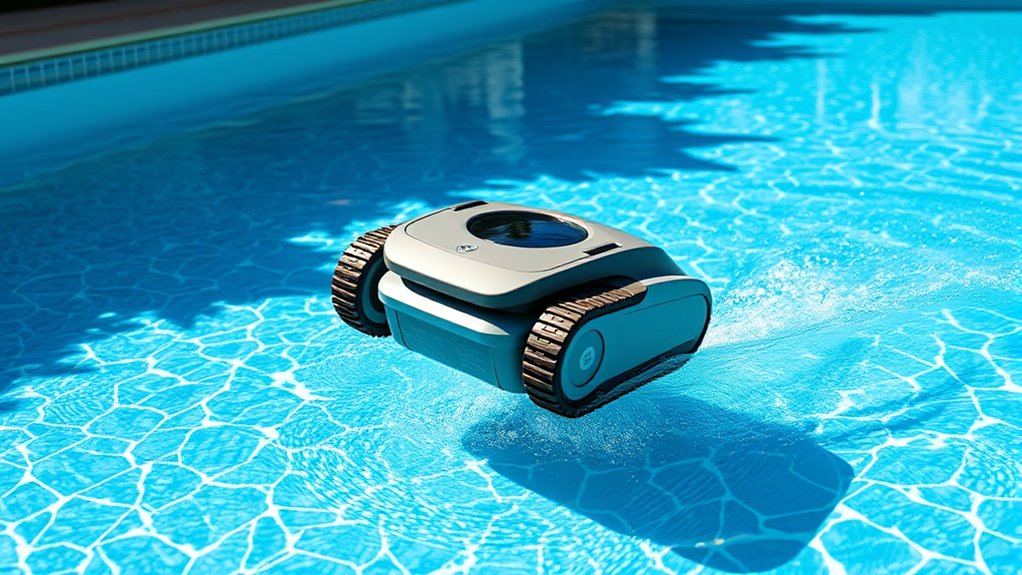
You might assume that automatic pool cleaners only work well on certain surfaces, but in reality, most models are designed to handle a variety of pool types effectively. Their surface compatibility guarantees you don’t need multiple cleaners for different surfaces, saving you time and effort. Whether you have a concrete, vinyl, or fiberglass pool, these cleaners are built to adapt and perform. While debris effectiveness can vary depending on the surface, modern models are optimized to pick up dirt, leaves, and other debris across different pool types. Keep in mind, selecting a cleaner suited to your pool’s surface will maximize cleaning efficiency and extend the device’s lifespan. So, rest assured—most automatic cleaners are versatile enough to work well on all pool surfaces.
You Only Need to Run Them Occasionally
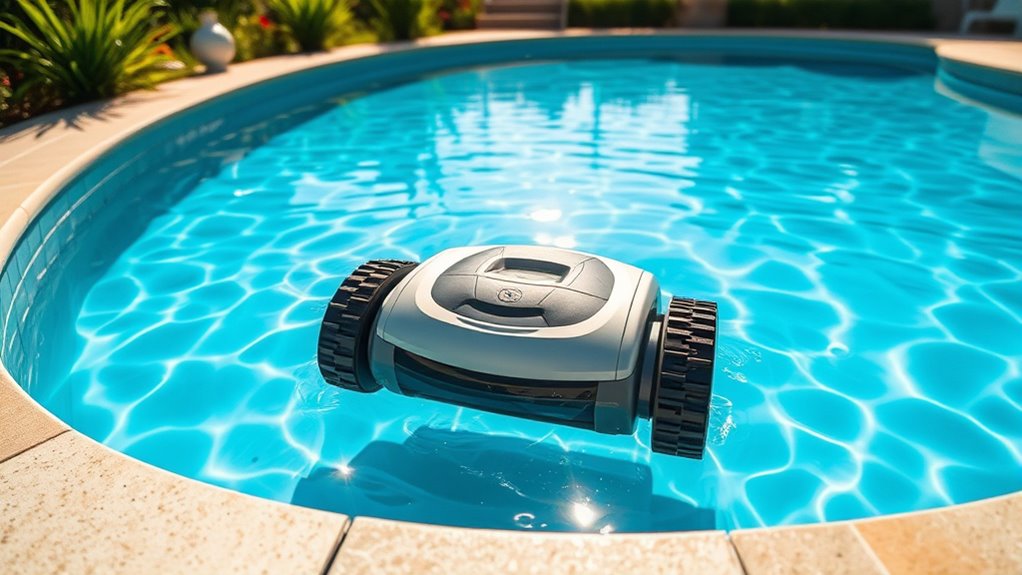
Many people assume that running their pool cleaner only once or twice a week is enough to keep the pool spotless. But that’s a misconception. Your pool’s water temperature and chemical levels influence how often you should run it. If the water is warm, algae and bacteria grow faster, requiring more frequent cleaning. Additionally, fluctuating pool chemical levels can lead to dirt buildup or cloudy water. To stay ahead of dirt and debris, consider these tips:
- Run the cleaner after heavy use or storms
- Increase frequency during hot, sunny days
- Check and adjust pool chemical levels regularly
- Run the cleaner more often if water temperature rises
Consistent cleaning prevents buildup, ensures proper chemical balance, and keeps your water crystal clear.
Frequently Asked Questions
Do Automatic Pool Cleaners Work Well With All Pool Sizes?
Automatic pool cleaners work well with most pool sizes, but your pool’s size can affect cleaner compatibility. Smaller pools typically need lightweight, easy-to-maneuver models, while larger pools may require more robust, high-capacity cleaners. Always check the cleaner’s specifications to make sure it’s suitable for your pool size. Proper compatibility guarantees effective cleaning, saving you time and effort, regardless of whether your pool is small or large.
How Often Should I Service My Automatic Pool Cleaner?
You should service your automatic pool cleaner weekly to keep it functioning at its best. Follow a regular maintenance schedule by cleaning filters, brushes, and debris traps, and inspect for any wear or damage. If you notice poor cleaning performance, consult troubleshooting tips like checking for blockages or tangled hoses. Regular maintenance ensures your cleaner operates efficiently, extends its lifespan, and keeps your pool sparkling clean.
Can Automatic Cleaners Pick up Fine Algae and Bacteria?
Automatic pool cleaners can pick up some fine algae and bacteria, but they might not remove all tiny particles effectively. To guarantee thorough bacteria removal and eliminate fine algae, you should regularly brush the pool, maintain proper chemical levels, and shock the water when needed. Relying solely on your cleaner might leave behind residues, so combining it with good overall pool maintenance gives you the best results.
Are Robotic Pool Cleaners Energy-Efficient?
Imagine your pool as a serene oasis, and a robotic cleaner as your silent guardian. These devices are surprisingly energy-efficient, helping you save on electricity bills while reducing environmental impact. With smart technology, they optimize energy savings by working only when needed. By choosing a robotic pool cleaner, you not only keep your pool pristine but also contribute to a greener planet, turning pool maintenance into an eco-friendly routine.
What Features Should I Look for in a High-End Automatic Pool Cleaner?
When choosing a high-end automatic pool cleaner, you should look for advanced cleaning technology that guarantees thorough pool maintenance. Features like multi-surface cleaning, efficient navigation, and smart sensors make a big difference. Consider models with programmable schedules and powerful suction for maximum performance. These features help you save time, reduce effort, and keep your pool pristine. Prioritize quality and innovative design to enjoy seamless, reliable cleaning.
Conclusion
Think of your pool like a garden—you can’t just water it once and expect it to thrive. Automatic cleaners are a helpful tool, but they’re not magic. Regular skimming and brushing, combined with a good cleaner, keep your pool in top shape. Relying solely on one thing is like watering a plant once a month—it won’t flourish. Embrace a balanced approach, and your pool will stay sparkling all season long.
